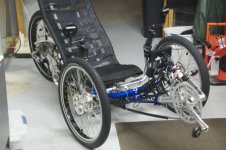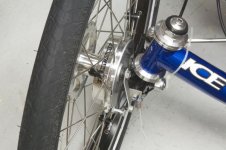izeman said:
Chalo said:
Any brake that will skid the rear wheel, or tip the bike up if used in the front, has all the braking power it is physically possible to use.
that's correct if you add: AT THE WANTED MAXIMUM SPEED. a brake that makes the front wheel lock at 20km/h may be too weak to stop a bike at 50km/h. and that's the point. i think EVERY perfectly adjusted brake is sufficient for regular human powered bikes. but we're talking about "bikes" that go up to 80mph/130km/h. my bike does 40mph/65km/h and i need all the brake power i can get. that said my 203mm hydraulic disc brake in the front, and 160mm at the rear with regen braking is just "ok".
kinetic energy is squared when speed is doubled. so 40km/h needs 4 time the stopping power then 20km/h. 80km/h needs 16 times the stopping power of 20km/h.
It is force that tips the bike, and power that burns off velocity as heat. Discs win in terms of braking force per lever force. They lose in terms of maximum braking force. They lose
big time in terms of braking power and energy dissipation before failure. It's a simple matter of rotor physics. You'll warp your rotors, boil your hydraulic fluid, and/or melt plastic and rubber components of your disc brakes well before a rim brake on a heavy aluminum rim reaches its limits.
You don't know these latter things, and you'll never have to know. All you know from personal observation is that discs feel stronger when you give them a little squeeze. That's because you're simply not big enough, and your bike not long enough, to test your discs beyond their limits of force, power and energy dissipation. Even motorbike type speeds on an e-bike are just not all that energetic compared to high mass times significant elevation changes. The faster you go, the more aero drag helps your brakes slow you down. You are arguing for discs on the precise points where they are most inferior to rim brakes-- power and energy. If your reasoning goes, "my hands are weak and they tire very quickly, so I have a difficult time stopping from high speeds", then that is a point on which disc brakes offer a real advantage.
Motorbikes have massive powerful brakes not because they have to stop from high speeds, but because they have the power to speed back up and do it over and over again in a very short span of time, without allowing the brakes to cool down adequately between stops. Bicycle disc brakes are an even worse choice for such duty than bicycle rim brakes, because they have less thermal mass to absorb heat and less surface area to discharge it from than either rim brakes or motor vehicle discs. Just about everyone who uses discs or drums knows about brake fade. You know what kind of brakes don't get hot enough to fade? Rim brakes. Fade is just not an issue for rim brakes, because they don't get nearly as hot from the same energy input levels that fade discs.
For as long as there is a motor cult, there will be some motor cultists who favor disc brakes on bicycles for reasons other than their actual virtues, who swear discs are better because they are discs, and discs are better. (When and if motor vehicles switch to magnetic brakes, those folks will then decide that only magnetic brakes are adequate for their "extreme", "hardcore", "intense" cycling.) And of course there will remain some specialty applications that require disc brakes or other hub brakes for their actual virtues. But rim brakes will never be superseded, because it's plain good engineering to do two jobs with one part (the rim) that you must have anyway.




